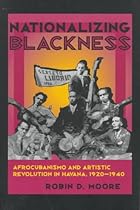Read Nationalizing Blackness: Afrocubanismo and Artistic Revolution in Havana, 1920–1940 (Pitt Latin American Series) by Robin Dale Moore Online
^ Nationalizing Blackness: Afrocubanismo and Artistic Revolution in Havana, 1920–1940 (Pitt Latin American Series) ↠ PDF Download by ! Robin Dale Moore eBook or Kindle ePUB Online free. Nationalizing Blackness: Afrocubanismo and Artistic Revolution in Havana, 1920–1940 (Pitt Latin American Series) Nationalizing Blackness uses the music of the 1920s and 1930s to examine Cuban society as it begins to embrace Afrocuban culture. Moore examines the public debate over “degenerate Africanisms” associated with comparas or carnival bands; similar controversies associated with son music; the history of blackface theater shows; the rise of afrocubanismo in the context of anti-imperialist nationalism and revolution against Gerardo Machado; the history of ca

| Title | : | Nationalizing Blackness: Afrocubanismo and Artistic Revolution in Havana, 1920–1940 (Pitt Latin American Series) |
| Author | : | |
| Rating | : | 4.48 (996 Votes) |
| Asin | : | 0822956454 |
| Format Type | : | paperback |
| Number of Pages | : | 336 Pages |
| Publish Date | : | 2017-02-14 |
| Language | : | English |
"Interested in African-Latin music? Read this!" according to A reader. This book needed to be written. It is the story of Afro-Cuban musicians in the pre-revolutionary atmosphere of commercialism and imperialism from the US. Part of the story revolves around the racism of that era, which existed as well in the genres of big band and jazz. And part of the story revolves around the music of that time period--some of the richest and most complex in Latin American history. If you want to understand the use of African cultural identifications in popular music, this is a good place to start. It fills in some of the history whi. an important work about race and music in cuba Robin Moore's work is an important contribution to cuban studies. Combining archival research and interviews, Moore traces the arc of afrocuban cultural expression in the early 20th century from dispised cultural form to national symbol, a process, moore notes, which has interesting parallels to the United States. Scholarly but readable, this book is destined to become a standard work in cuban musicology and contributes to cultural, ethnic, and popular music studies.. A must read ! An important work that sheds light and understanding of the struggles and triumphs of Afrocubans and their culture. Robin D. Moore takes you into a fascinating journey, with scholarly research and in depth analysis, of the racial experience during a period of tremendous changes and unrest in Cuba. This work is an enormous contribution to our understanding of this period between 1920 through 19A must read ! Joe Hernandez, Int'l Latin Music Hall of Fame An important work that sheds light and understanding of the struggles and triumphs of Afrocubans and their culture. Robin D. Moore takes you into a fascinating journey, with scholarly research and in depth analysis, of the racial experience during a period of tremendous changes and unrest in Cuba. This work is an enormous contribution to our understanding of this period between 1920 through 1940Bravo!. 0Bravo!
“Moore’s fascinating and well-written study is intellectually daring in its argument, thorough in its social-historical research, and deserving of a wide audience in the social sciences.”---Cristobal Diaz, Fundacion Musicalia, Puerto Rico
Nationalizing Blackness uses the music of the 1920s and 1930s to examine Cuban society as it begins to embrace Afrocuban culture. Moore examines the public debate over “degenerate Africanisms” associated with comparas or carnival bands; similar controversies associated with son music; the history of blackface theater shows; the rise of afrocubanismo in the context of anti-imperialist nationalism and revolution against Gerardo Machado; the history of cabaret rumba; an overview of poetry, painting, and music inspired by Afrocuban street culture; and reactions of the black Cuban middle classes to afrocubanismo. He has collected numerous illustrations of early twentieth-century performers in Havana, many included in this book.Nationalizing Blackness represents one of the first politicized studies of twentieth-century culture in Cuba. It demonstrates how music can function as the center of racial and cultural conflict during the formation of a national identity.
Download Nationalizing Blackness: Afrocubanismo and Artistic Revolution in Havana, 1920–1940 (Pitt Latin American Series)
Download as PDF : Click Here
Download as DOC : Click Here
Download as RTF : Click Here
